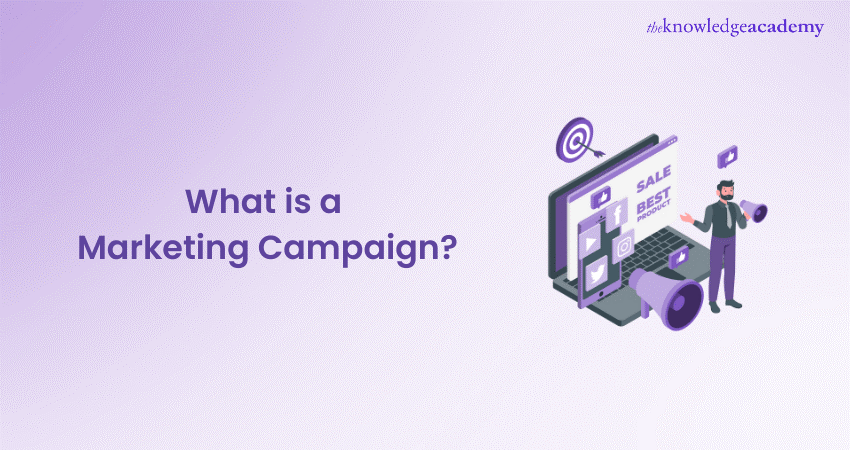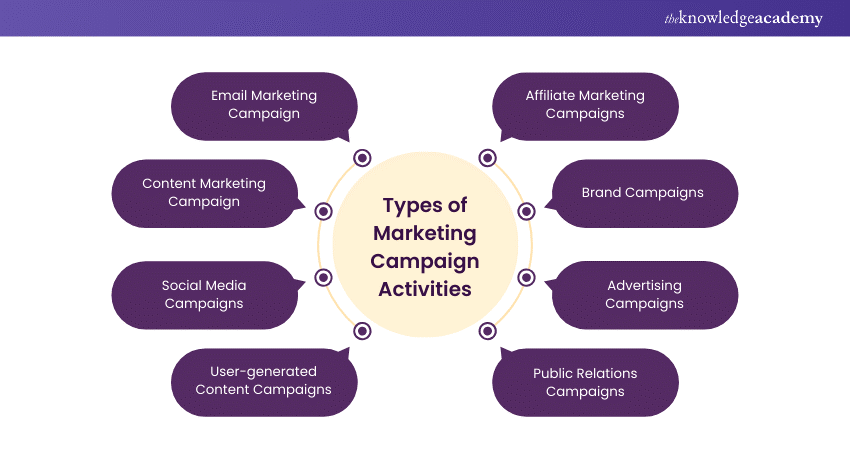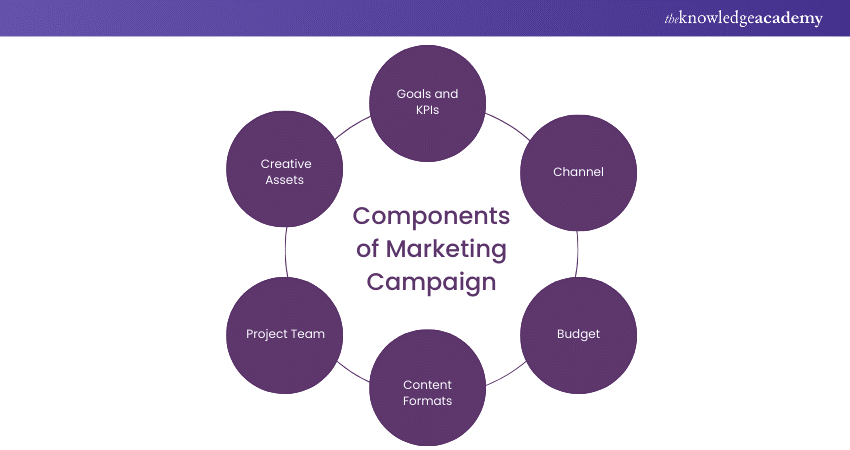We may not have the course you’re looking for. If you enquire or give us a call on +49 8000101090 and speak to our training experts, we may still be able to help with your training requirements.
We ensure quality, budget-alignment, and timely delivery by our expert instructors.

Are you looking for ways to make a big impact in the market? Incorporating Marketing Campaigns into your overall strategy is essential. But What is a Marketing Campaign exactly? It’s a detailed plan designed to boost your product or service's visibility and sales by combining eye-catching ads, effective sales methods, and digital expertise.
Marketing Campaigns involve carefully planned steps that create a strong desire for your brand. They tell a compelling story that resonates on a personal level, making people truly connect with your brand. Curious to learn more about Marketing Campaigns? Check out our blog to discover how to bring your brand’s story to life, engage more people, and achieve greater success.
Table of Contents
1) Unveiling What is a Marketing Campaign?
2) Types of Marketing Campaign Activities
3) Components of Marketing Campaign
4) What are the Advantages of a Marketing Campaign?
5) Examples of Successful Marketing Campaigns
6) Conclusion
Unveiling What is a Marketing Campaign?
A Marketing Campaign is a strategy a business can use to promote its products and brand identity across various channels. It helps boost brand awareness, launch new products in the market, spiking sales, or countering adverse publicity. These campaigns are crafted with clear goals that guide the intensity of marketing activities and the choice of media. It could be traditional outlets like TV and print or digital spaces like social media and online ads, selected to best engage the intended demographic.
The essence of a potent Marketing Campaign lies in its strategic planning, creative content, and meticulous execution. It is vital for any business size to effectively manage its marketing drive and achieve its desired outcomes.
Types of Marketing Campaign Activities
Marketing Campaigns play a crucial role in establishing a brand presence, attracting customers, and driving conversions. Here are eight types of Marketing Campaigns that can help your brand succeed.

1) Email Marketing Campaign
Email marketing is an ongoing marketing program that can boost sales. This may include drip emails sent over time, leading up to and during the launch of a new product or event. These targeted emails are often sent to a smaller segment of a larger email list, such as a VIP list.
2) Content Marketing Campaign
Content Marketing Campaigns use optimised content to convey a message. Brands usually develop a content calendar with a goal in mind. For example, to promote the launch of a new product, they may create content explaining its usage and unique features. This content is then shared on the brand's blog or converted into downloadable assets to generate leads.
3) Social Media Campaigns
Social Media Campaigns usually span multiple platforms. Brands that prioritise social media marketing aim to increase awareness, drive traffic to their website, boost brand sentiment, and gather customer feedback. For example, a retail campaign might include videos on TikTok, paid ads on Instagram, or a hashtag-driven content push.
4) User-generated Content (UGC) Campaigns
UGC campaigns aim to build brand awareness by encouraging customers to create and share content aligned with the brand's message. Unlike Social Media Campaigns where the focus is on resharing brand content, UGC involves customers generating their own content. When executed effectively, UGC campaigns can yield powerful results.
5) Affiliate Marketing Campaigns
Affiliate marketing involves providing influencers, ambassadors, and customers with unique codes to share with their audiences. Affiliate Marketers receive a commission when someone makes a purchase using their code. Brands often use affiliate campaigns to promote new products or expand their market reach through multiple influencers.
6) Brand Campaigns
Brand campaigns are targeted communications aimed at raising awareness of a brand. They typically utilise various media channels such as press releases, social media, and videos to convey the brand story and values. Successful brand campaigns, like Patagonia's Worn Wear initiative, resonate with audiences and reinforce brand identity.
7) Advertising Campaigns
Advertising campaigns rely on traditional marketing methods to promote a brand and its products. This may include print advertising, social media ads, and pay-per-click marketing to increase brand awareness and drive traffic to a website.
8) Public Relations (PR) Campaigns
PR campaigns focus on building brand awareness by securing media coverage and generating positive publicity. This involves offering quotes or interviews to journalists, publishing press releases, and fostering relationships with media outlets to amplify brand messaging and reputation.
Boost your online visibility and drive targeted traffic with our expert-led Search Engine Marketing (SEM) Training – Join now!
Components of Marketing Campaign
There are several components that go into the planning, execution, and results of a Marketing Campaign. Let’s discuss the most important components of campaigns below.

1) Goals and Key Progress Indicators (KPIs)
This section outlines the ultimate objectives of your initiative. You’ll establish concrete, quantifiable targets. Subsequently, you’ll specify the metrics that will gauge your advancement.
For example, suppose your initiative is centred around content generation; you might track its success through organic viewership. You could set a goal for each article to attract 1,000 views monthly and acquire ten new leads. These metrics will be monitored using campaign management tools like Google Analytics and Looker.
2) Channel
Identify the platforms where your content and communications will be disseminated. If you’re orchestrating a social media marketing initiative, consider focusing on the platforms where your target audience is most engaged. Exclude those platforms where building a dedicated following is unlikely.
3) Budget
While not all marketing initiatives necessitate additional funding, many do. Include costs related to agencies, advertising, and independent contractors. Incorporate these figures into any return on investment (ROI) calculations for your initiative.
4) Content Formats
Decide content formats to drive the initiative forward. It’s typical for marketers to integrate various content forms into a single campaign. For instance, a brand awareness campaign might encompass video commercials, press announcements, and collaborative blog entries.
5) Project Team
Identify the team members responsible for implementing the initiative. Prior to launching your campaign, assign individuals to manage every facet of the project. Ascertain who will be in charge of content creation, graphic design, media procurement, and performance analysis.
6) Creative Assets
An exceptional Marketing Campaign warrants equally impressive creative resources. Whether it’s an elegant website layout or a dynamic infographic, ensure your designs are polished. All your resources should align with the campaign’s intent.
Take your business to the next level with our Digital Marketing Courses - Sign up now!
What are the Advantages of a Marketing Campaign?
Marketing initiatives vary widely, encompassing everything from modest online efforts to expansive, cross-channel operations. The advantages of executing Marketing Campaigns include:
1) Achieve Targeted Objectives: Strategic Marketing Campaigns are instrumental in propelling brands towards achieving specific objectives.
2) Expand Customer Base: By highlighting a brand and its offerings, Marketing Campaigns serve to broaden the brand’s reach, attracting a larger audience of prospective customers.
3) Stimulate Sales Growth: The heightened visibility of a brand and its products can translate into increased sales. Campaigns are frequently deployed to spotlight new offerings or to boost sales volumes for existing products.
4) Enhance Brand Perception: Campaigns that focus on a brand’s core values and interests forge deeper connections with consumers who share similar values, potentially reshaping public perception of the brand.
5) Grow Market Share: In competitive sectors, Marketing Campaigns are a tactic used by brands to differentiate themselves and secure a competitive advantage.
6) Foster Consumer Engagement: Engaging Marketing Campaigns, such as Dove’s Real Beauty initiative, are designed to spark conversation and create a buzz around the brand and its products.
These campaigns, including Integrated Marketing Campaigns, are multifaceted, ranging from compact digital initiatives to extensive, integrated marketing efforts. Each campaign is tailored to meet the brand’s unique goals and engage with the target audience effectively.
Looking for a better marketing strategy? Join our Campaign Planning Training and elevate your digital footprint.
Examples of Successful Marketing Campaigns
Now that we understand about What is Marketing Campaign, types and advantages, let’s look into some successful Marketing Campaigns:
1) The Barbie movie campaign
The Barbie movie’s 2023 marketing strategy was a masterclass in anticipation-building. With a 118.15 GBP million budget, it employed a “breadcrumb strategy,” releasing teasers throughout the year leading to the premiere. Collaborations with brands like Crocs for themed merchandise and a Social Media Campaign sparked a wave of User-generated Content (UGC).
Success Factors: The campaign’s genius lies in its ability to create a “content snowball effect.” As brands clamoured to associate with Barbie, the film gained additional exposure, and consumers amplified this by crafting their own social media content.
2) Apple's Shot on iPhone campaign
Apple’s Shot on iPhone campaign was a response to criticism of its camera quality. It encouraged users to capture photos and share them with the hashtag #shotoniphone. The best images were then showcased on billboards across 25 countries.
Success Factors: This campaign addressed a specific challenge—demonstrating the iPhone camera’s prowess. The resulting UGC provided material for other marketing efforts, while the billboard displays added a new dimension of brand visibility.
3) Bulldog's Non-Dry January campaign
Bulldog Skincare cleverly played on the Dry January movement, focusing instead on skin hydration. The campaign featured striking billboards and social media ads promoting skin moisture.
Success Factors: Bulldog’s success hinged on its inventive twist on the “dry” concept, traditionally associated with abstaining from alcohol, to promote its hydration message.
4) Pantone's Create Your World campaign
Pantone’s Create Your World campaign on Instagram and in print ads encouraged creative colour combinations. It presented surreal landscapes in unique palettes, sparking discussions and engagement.
Success Factors: The campaign’s triumph was not in direct sales but in fostering brand engagement through stimulating conversations and showcasing the brand’s creative potential.
5) Spotify's Wrapped campaign
Spotify’s Wrapped campaign has become an end-of-year ritual, with users eagerly sharing their year-in-review playlists. It highlights their most-played songs, favourite genres, and listening hours.
Success Factors: The success of the wrapped campaign is rooted in its personalisation, showing Spotify’s appreciation for its users. It also piques curiosity and encourages sharing, which, in turn, enhances Spotify’s brand engagement and awareness.
Conclusion
Understanding what is a Marketing Campaign and the various types of marketing is essential for businesses to efficiently promote their products and engage with their target audience. A well-executed Marketing Campaign can elevate brand visibility, drive sales, and foster lasting customer relationships.
Increase your marketability and career opportunities in Digital Marketing with our Google Analytics Certification - Join now!
Frequently Asked Questions
Can Small Businesses Afford to run Marketing Campaigns?

Yes, small businesses can afford Marketing Campaigns. They often utilise cost-effective digital platforms and targeted strategies to reach their audience efficiently.
What Role does storytelling play in a successful Marketing Campaign?

Storytelling in Marketing Campaigns creates emotional connections. It makes the brand memorable and relatable, which can boost engagement and conversion rates.
What are the Other Resources and Offers Provided by The Knowledge Academy?

The Knowledge Academy takes global learning to new heights, offering over 3,000 online courses across 490+ locations in 190+ countries. This expansive reach ensures accessibility and convenience for learners worldwide.
Alongside our diverse Online Course Catalogue, encompassing 19 major categories, we go the extra mile by providing a plethora of free educational Online Resources like News updates, Blogs, videos, webinars, and interview questions. Tailoring learning experiences further, professionals can maximise value with customisable Course Bundles of TKA.
What is the Knowledge Pass, and how Does it Work?

The Knowledge Academy’s Knowledge Pass, a prepaid voucher, adds another layer of flexibility, allowing course bookings over a 12-month period. Join us on a journey where education knows no bounds.
What are Related Courses and Blogs Provided by The Knowledge Academy?

The Knowledge Academy offers various Digital Marketing Courses, including the Campaign Planning Training, Pinterest Marketing Course, and Display Advertising Course. These courses cater to different skill levels, providing comprehensive insights into Affiliate Marketing Tools.
Our Digital Marketing Blogs cover a range of topics related to Campaign Marketing, offering valuable resources, best practices, and industry insights. Whether you are a beginner or looking to advance your Digital Marketing skills, The Knowledge Academy's diverse courses and informative blogs have got you covered.
Upcoming Digital Marketing Resources Batches & Dates
Date
 Campaign Planning Training
Campaign Planning Training
Fri 21st Feb 2025
Fri 25th Apr 2025
Fri 20th Jun 2025
Fri 22nd Aug 2025
Fri 17th Oct 2025
Fri 19th Dec 2025






 Top Rated Course
Top Rated Course



 If you wish to make any changes to your course, please
If you wish to make any changes to your course, please


